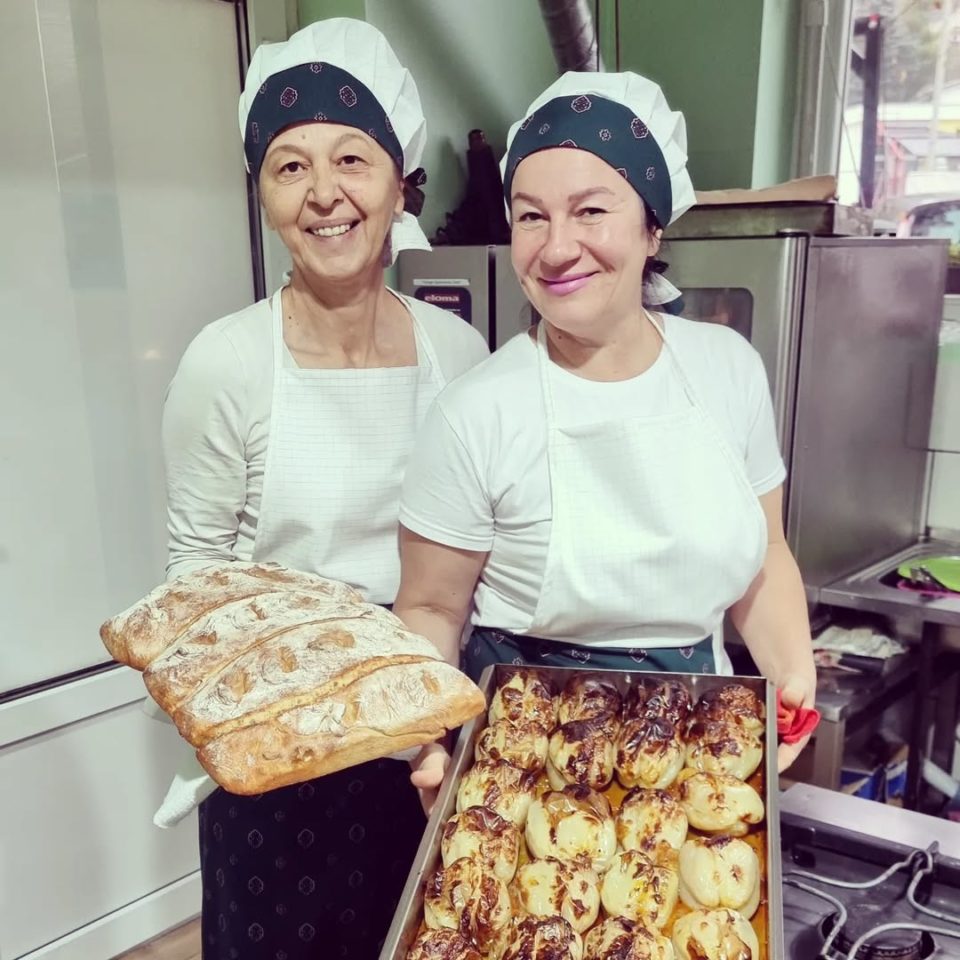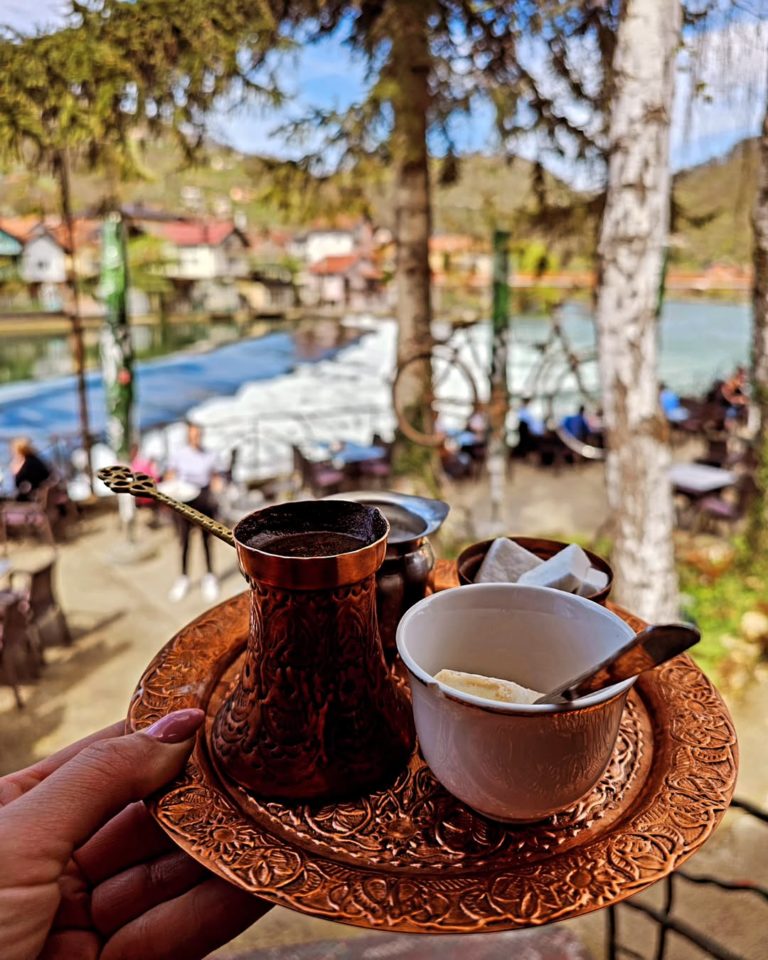
Food is a fundamental human need. However, from sociological and anthropological perspectives, it is so much more—associated with region, habits, lifestyle, customs, and even religion.
In today’s world, food is also an indicator of the society we live in. Under the global capitalist system, the differences between the rich and the poor are visible in communities’ access to and relationships with food.
In Bosnia and Herzegovina, you often hear the saying: “It’s a sin to throw away bread.” Walking through the streets of many Bosnian cities, you might notice bags of bread hanging on dumpsters, a small but significant tradition that connects those with more to those with less. For some, that slice of bread may be their only meal of the day. The custom of never wasting bread is just one of the food-related traditions passed down from generation to generation in our society. Some food customs are shared by all three ethnic groups in Bosnia and Herzegovina, uniting people through ingredients, spices, and dishes. However, they can also sometimes spark minor tensions, such as debates over who has the best ćevapi (grilled minced meat) in Bosnia or whether burek (a filled pastry) can have fillings other than meat, and if so, how many types of burek exist.
For Admira Hajdarpašić, owner of the restaurant Slap in Banja Luka, food has the power to bring people together. Around the table, meals are not only enjoyed but also encourage the exchange of stories, traditions, and emotions. Slap was founded in 2006 and continues to operate at full capacity today. Located on the right bank of the Vrbas River, it keeps visitors coming back with its delicious homemade cuisine and beautiful vintage ambiance, filled with antiques. The restaurant is also popular for its large terrace, where you can treat not only your tastebuds but other senses, with the sights and sounds of the Vrbas River waterfall.

Along with numerous traditional dishes such as Begova Čorba (traditional Bosnian chicken soup), veal prepared under a bell, and sarma (stuffed cabbage), Slap is widely known for its Banja Luka ćevapi.
Ćevapi as a Symbol of Unity
“Ćevapi, as the national dish of Bosnia and Herzegovina, are a symbol of unity and hospitality, bringing together people from different cultures and generations. Banja Luka ćevapi are recognizable by their unique shape, as they are formed in connected sets of four, and by their simple recipe that emphasizes the natural taste of the meat. Grilled with care and a touch of soul, they become a true gastronomic delight,” explains Admira, describing the dish.
In the Hajdarpašić family, recipes are passed down from generation to generation. “This is crucial to preserving tradition and preventing the richness of flavors from fading into oblivion. Recipes are not just a way of preparing food; they are a reflection of culture, identity, and the history of a people,” Admira reflects.
Food’s ability to foster a sense of connection and belonging is also emphasized by Sanda Mešinović, a demography graduate. As she explained, food shapes our lives from their very beginnings. “From the moment we enter our mother’s arms, breastfeeding is not just about survival and nourishment but also about human contact and togetherness. It contributes to our sense of belonging. From that moment on, food is in our DNA, and serves as an opportunity for reconnection, exchange, nurturing, and belonging,” said Sanda.
Traditional dishes reflect specific cultures and can contribute to a sense of community and unity, even in the act of preparing them. But their role is not limited to connecting us to our own culture, as Sanda emphasizes: “It is also an opportunity to get to know the different, the other, the diversity that planet is so rich with. Preparing food meets a basic biological need, but at the same time, it is a ritual full of awareness, intention, presence, and something higher—the transmission of Spirit, love, and tenderness towards others but also towards oneself.”
In the diverse society of Bosnia and Herzegovina, similarities and differences in eating habits are often linked to religion. Practices like fasting, as well as specific festive holiday dishes holidays should be seen as opportunities for learning rather than division.
“Nothing based on divisions or obduracy can grow, develop, renew, or endure in the long run. Only diversity, flexible enough to accommodate and respect personal origins, can nurture the development of a healthy and conscientious individual and society. If we only focus on heritage and tradition, without adapting or being open to different contexts, social conditions, and global diversity, what is most sacred in us will slowly fade away,” says Sanda.

The Richness of Holiday Feasts
The beauty of Bosnia and Herzegovina lies in its multiculturalism. Although there has been a decline in mixed marriages since the 1990s, these unions still exist today, offering opportunities for inclusive holiday feasts, whether tied to Eid, Christmas, or traditional Sunday family lunches.
Dragana Ilibašić notes that such celebrations have been a part of her life since she was young.
“Even as a child, I enjoyed painting Easter eggs with one grandmother, while for Eid, I would work with my mother on preparing baklava (filo pastry filled with chopped nuts). I remember the preparations for celebrating the Slava (a family’s annual saint veneration) with my grandfather, the days when my grandmother made several different types of dry cakes: from wafers to shortbread cookies, as well as the holiday meals for Eid, which were always made up of several traditional dishes. My mother always rolled out the dough for burek and taught me how to do it over the years. Although today I buy pre-made dough, I would never trade those magical moments when we are all gathered around the table for both Christmas and Eid, sharing not only gratitude for the abundant table but also for the beauty of our family’s diversity,” Dragana shared.
From these stories, it is clear that although we live in a time of high consumption and fast-food, the greater social and cultural significance of food is still a powerful force in shaping our society. Food represents a place of connection, community, belonging, mutual growth, support, and love.
“Regardless of skin color, gender, age, religion, race, or any other affiliation, food is a universal language of love. With it, we can show our great capacity to give love but also to receive it from those who are different from us,” Mešinović concluded.






